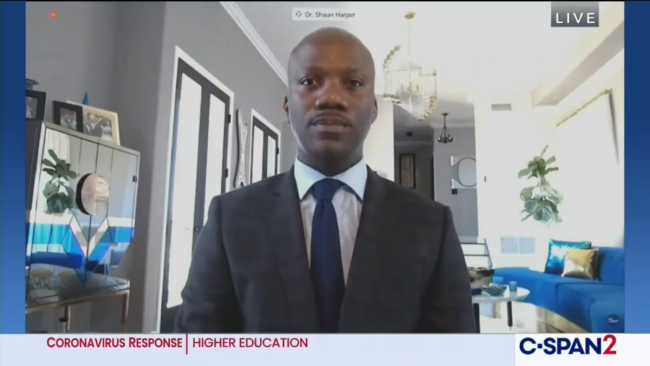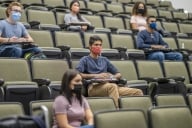You have /5 articles left.
Sign up for a free account or log in.

Shaun R. Harper, executive director of USC's Race and Equity Center, testifies to a House committee Tuesday.
C-SPAN
As the Trump administration leaned on governors to reopen their states' schools and a U.S. House subcommittee debated whether to give colleges the additional billions they say they need, the head of the University of Southern California’s Race and Equity Center urged lawmakers to take steps to make sure resuming campus learning does not worsen disparate impacts the coronavirus pandemic has had on communities of color.
With Congress beginning to consider another coronavirus relief package, Shaun R. Harper called on the House higher education subcommittee to earmark money for colleges to protect front-line campus workers such as custodians and food service workers who are disproportionately Black and Latino.
People of color have been unequally infected by the deadly virus, said Harper, a USC provost professor and president of the American Educational Research Association. Not taking action “places people of color and their family members they live with at greater risk,” he told lawmakers during a hearing on the needs of colleges during the pandemic.
Harper also called for colleges to not worsen the disparate loss of jobs by Black workers with reopening plans by considering race in making layoffs. Among a number of other issues he raised, Harper also urged Congress to ensure that college students from minority groups have enough access to mental health services.
“Students and workers from these groups are likelier than are their white classmates and colleagues to have lost a family member, friend or someone in their community,” he said. “This then means that students of color and employees of color are much more susceptible to prolonged sadness and depression.”
And given that more than half of college football and basketball players for teams in major conferences are Black, he said resuming those sports “places Black undergraduate men at disproportionate risk of COVID-19 infection.”
Harper spoke as the Trump administration on Tuesday held discussions at the White House with K-12 leaders and college presidents and a call with governors. The administration pushed for schools to reopen even as cases spiked in several states and amid reports of outbreaks at campuses, including 146 positive tests for the virus at the University of Washington’s fraternity row.
Administration officials argued at both that reopening was needed to move the nation toward normalcy and for the good of children whose education has been hindered.
“We’re very much going to put pressure on the governors and the schools to reopen,” Trump said at the White House event, which included presidents of Ivy Tech Community College and Middle Tennessee University, and the chancellor of the University of Alabama system.
During the call, Vice President Mike Pence leaned on governors, including Larry Hogan of Maryland, Tony Evers of Wisconsin and Bill Lee of Tennessee, according to the notes taken by one person on the call, saying at one point, “It is the recommendation of your president … that we reopen schools.”
U.S. education secretary Betsy DeVos, according to the notes, also told the governors, “Education leaders need to examine real data and weigh risk … risk is involved in everything we do, from learning to ride a bike to riding a rocket into space and everything in between.”
Admiral Brett P. Giroir, assistant U.S. secretary of health, also assured the governors that between 10 and 20 million Becton Dickinson point-of-care tests, which can produce results in 15 minutes, will be available in August and September when schools are reopening. And Robert Redfield, director of the Centers for Disease Control and Prevention, said five additional documents to aid in reopening decisions will be released next week.
DeVos also said students have fallen behind during the closures. Dr. Elinore F. McCance-Katz, the assistant secretary of health and human services for mental health and substance use, also told the governors that going to school is important in children’s development, and that seven million children with emotional and psychological problems rely on school services for help.
Senior administration officials said the White House discussions were meant to share best practices on reopening. Though the focus was on reopening K-12 schools, Sue Ellspermann, president of Ivy Tech Community College, Indiana's two-year system, told Trump during a public event after the meetings it was important for institutions like hers to reopen. Many of the students were “single mothers, the 29- and 30-year-olds and beyond, who are coming back part-time,” she said. “They’re the ones who really need the opportunity for the American dream.”
Finis E. St. John IV, chancellor of the University of Alabama system, who also was invited to the meetings at the White House, said colleges had been worried students would prefer learning online. “We’re not worried about that anymore,” he said. “Our students are yearning to be back.”
Call for Funding From Congress
The American Council on Education estimates reopening safely will cost colleges and universities $74 billion.
Congress is split along partisan lines on how much more to give higher education on top of the $14 billion the industry received in the CARES Act.
"The CARES Act simply did not go far enough to prepare our institutions for this looming economic recession," said Representative Susan Davis, chairwoman of the higher education subcommittee. "For many educational institutions in America, these cuts and revenue losses mean severe reductions in services and programs that many vulnerable students need to complete their degrees and find fulfilling careers."
Davis backs the $3 trillion HEROES Act relief package the Democratic House is proposing.
The bill, which is far more than what the Republican Senate has said it is willing to pass, would provide $27 billion in additional funding to states for higher education. Colleges and universities would receive another $10.5 billion directly, including $1.7 billion aimed at historically Black colleges and universities and minority-serving institutions.
“We’re facing soaring costs and revenue losses from the pandemic,” Tim White, chancellor of the California State University system, said at the hearing, noting Cal State had to spend $100 million a month in protective gear and laptops, and is now facing a $299 million -- or 4.2 percent -- cut in state funding.
However, Republicans are pushing for higher education reforms in any stimulus package, including to encourage more colleges to adopt competency-based learning, which allows students to advance based on demonstrating mastery of skills or subjects instead of adhering to traditional college schedules. Scott Pulsipher, president of Western Governors University, told the subcommittee federal regulations make it more difficult for traditional colleges to incorporate the strategy.
"Instead of innovating, the Democrats’ partisan HEROES Act doubles down on failed policies,” said Representative Lloyd Smucker, from Pennsylvania, and the top Republican on the higher education subcommittee.
Citing an Urban Institute study, he noted that a proposal pushed by Democrats to forgive $10,000 of student loan debt would help many people with higher incomes.
"The bill also launches a socialist takeover of the private student loan market by forcing private student loan companies to offer income-driven repayment terms and conditions dictated by the federal government," Smucker said of the Democratic proposal.








